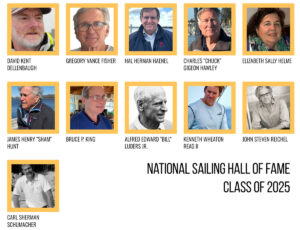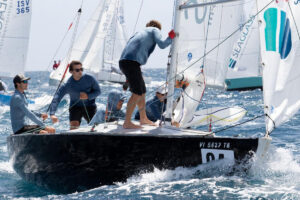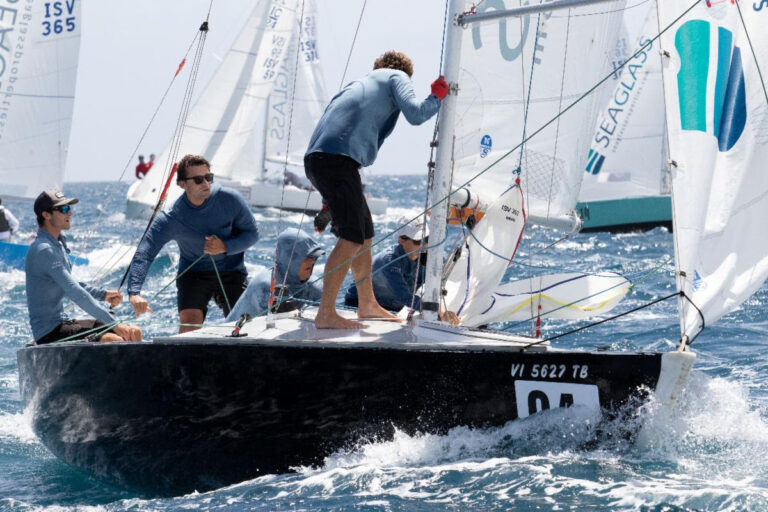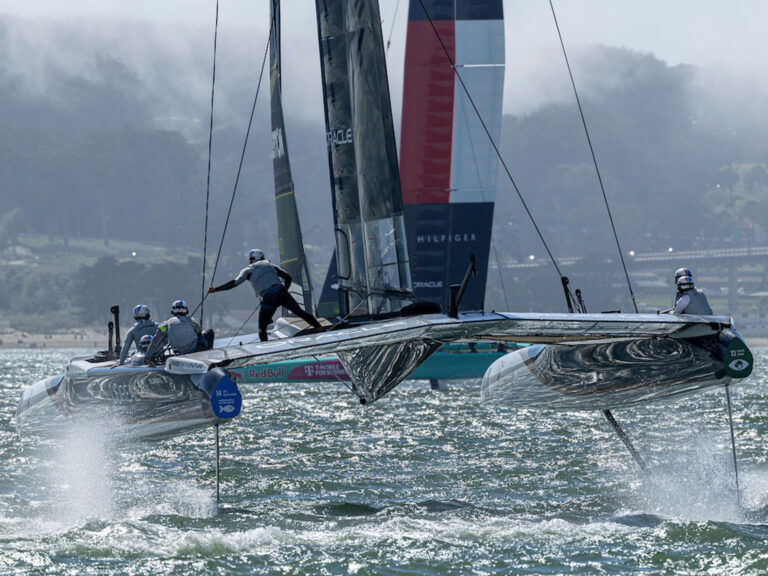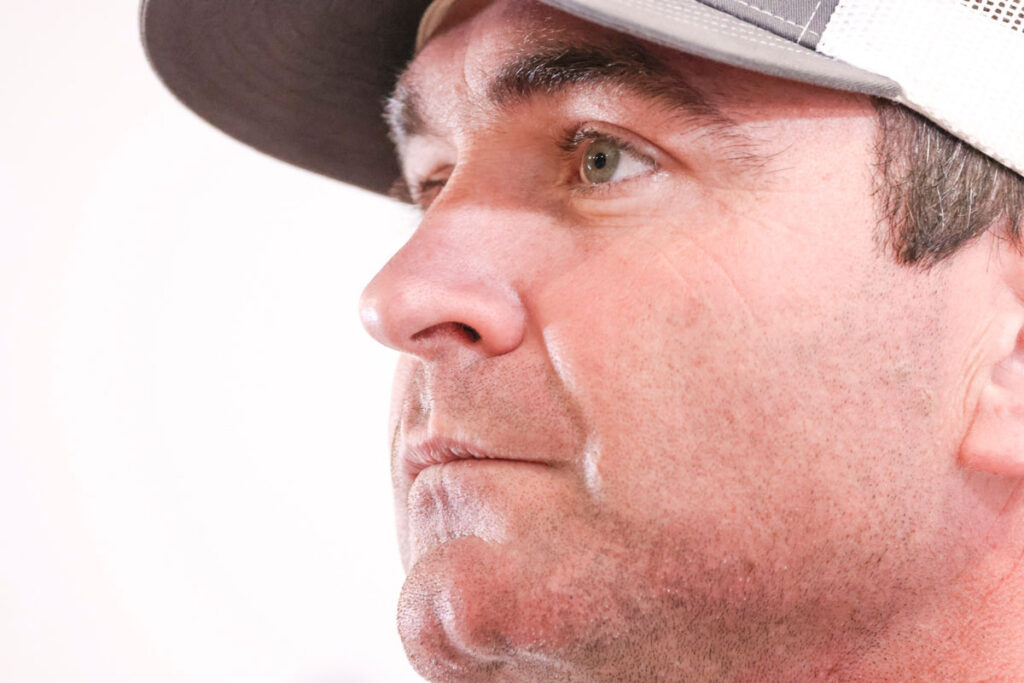
At US Sailing headquarters tucked away on the outskirts of Roger Williams University’s campus in Bristol, Rhode Island, the executive director’s office has sat vacant since last August. The organization has been headhunting a replacement to lead American sailing’s national governing body, but the nationwide talent search landed right back where it started—champion sailor and Bristol’s favorite sailor Charlie Enright was keen to lead the organization and will officially take the helm on May 1.
For Enright, a Brown University business economics major (’08), settling in behind the big desk at US Sailing’s HQ and leading an organization with a diverse constituency of nearly 36,000 members will take some serious personal adjustment. He’s been a pro sailor his entire adult life and has raced around the world three times with the Ocean Race. He’s only 40 years old (which would make him US Sailing’s youngest executive director, by a lot), and until he applied for the position, he says, he’d never built a resume or gone through a traditional job-interview process.
“Everything I’ve done before has been pretty entrepreneurial in nature, so applying for the job was definitely a new thing for me,” Enright says. “And to be honest, I wasn’t sure what I was signing up for, but the more I went through the process the more excited I became.”
As a perennially understaffed and underappreciated non-profit organization, US Sailing’s greatest challenge has been delivering on the expectations of its constituents to be everything for every sailor, from serving the grass roots to supporting the Olympic US Sailing Team and everything in between. Enright has a pretty good handle on the top challenges facing the organization, he says, but he admits it would be naive to walk into HQ with any preconceived notions and listen only to those whispering loudest in his ear.
“I think the first couple months are really about listening to the constituents, the partners, the stakeholders, the board and the membership,” he says. “I’m sure there will be plenty of people that will tell me what’s great, and plenty of people that will tell me what definitely needs to change. But we’ll be focusing on core competencies first—understanding what we do well and what we don’t do well—and just steering the ship from there. There’s fundraising and restoring Olympic success, while continuing the good work that’s done in education, training and programming. There’s a lot.”
A considerable amount of the organization’s attention and resources are consumed by its Olympic mandate, and such a focus on a few athletes at the top of the sport’s pyramid has long been a contentious rift among members. Convincing rank-and-file sailors of the organization’s value has forever been a challenge.
“You want people to want to be part of it—you certainly don’t want membership to feel like a tax,” Enright says. “You want to feel like you’re getting something for it, and nowadays, folks that are registering for certain regattas and have to join, will join; professional sailors join for the health insurance. Some join benevolently, or for any other reason, but we have to make people want to join and understand why they are joining.”
“You want people to want to be part of it—you certainly don’t want membership to feel like a tax,” Enright says. “You want to feel like you’re getting something for it, and nowadays, folks that are registering for certain regattas and have to join, will join; professional sailors join for the health insurance. Some join benevolently, or for any other reason, but we have to make people want to join and understand why they are joining.”
— Charlie Enright on tackling US Sailing’s membership
Enright follows Alan Ostfeld who came to the organization with a career in professional sports and entertainment properties. While not a sailor and wholly unfamiliar with the sport on his first day, Ostfeld is credited with professionalizing the organization. But still, the sentiment often heard around docks was that US Sailing would be better served by someone more intimate with the sport. Enright certainly comes with plenty of street cred, connections and proven leadership.
“I think there was a desire to bring a sailor back into the fold,” Enright says, “and I did feel that throughout the process. I’ve done a lot of sailing, obviously, but the Ocean Race campaign is not dissimilar to what I’ll be doing [at US Sailing]: budgeting, human resources and everything else that comes with it. I’m looking forward to it and I’m well positioned to take it on and get going.”
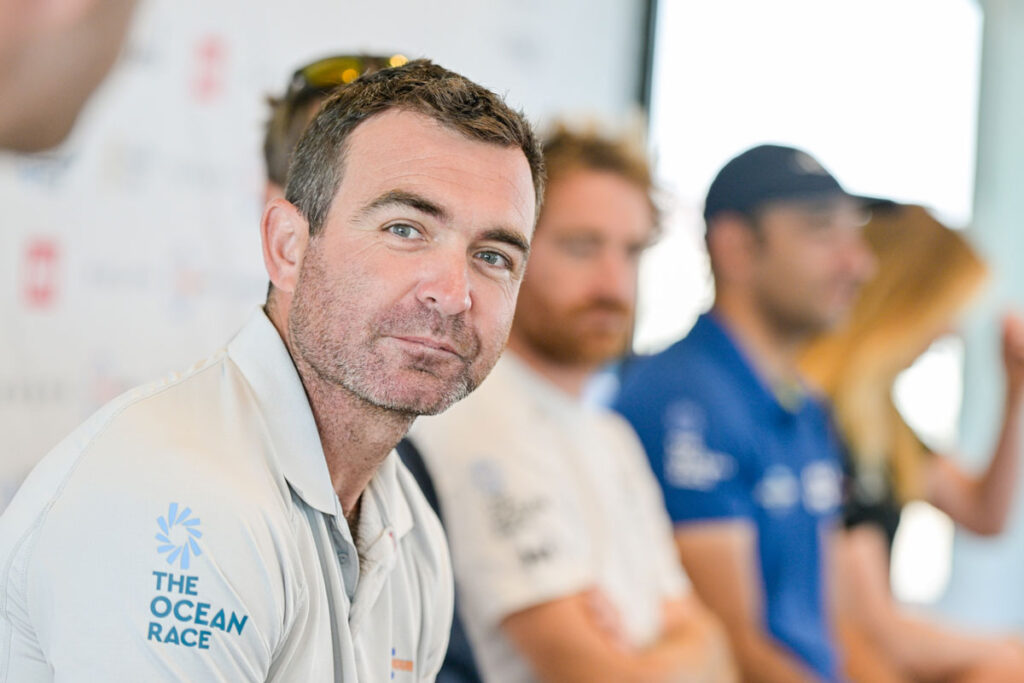
Getting the US Olympic Sailing team on a united path for the LA Olympic Regatta in three years is a monumental task, and it’s not one in which Enright can have much impact this late in the cycle. So, he’s pragmatic at the moment. “It’s a situation that I know enough about to be dangerous,” he says. “Everything I hear usually comes with a slant—or a perspective, if you will—so I really try to remain neutral. We are where we are. For me, today is like Day Zero, so it’s really about how we are gonna get better.”
In the meantime, he says, his priorities will focus on “fundraising, restoring the reputation of the organization and really bringing the trust back to the members of the sailing community. Also, continuing to highlight and improve all the things that US Sailing has done well for a long, long time—the programming education, the training, the certification, the ratings, the offshore office.”
And about that empty desk that awaits him in a few weeks. He’ll be behind it plenty, but the “Gone Sailing,” sign on his office door will be prevalent. When we speak by telephone on an early Sunday morning in mid-April, Enright has finished up a run and is on his way to a team meeting in Pensacola, Florida, where he’s racing on the GL52 Wizard.
“Having a ‘desk job’ is a huge lifestyle change for me,” he says, “but having a job in my hometown, having an impact on the sport that I love that has been so good to me for so long is very exciting. But, if I don’t sail 30 to 50 days a year I’m not going to be the person you want in the office anyway. I think it’s important to be out amongst the membership and have a finger on the pulse, know what’s going around and be the face of the franchise.
“To be available and accessible and understanding is really important with this job. Am I going to go around the world again next week? Probably not. But am I still going to do some grand-prix sailing? You bet. But I’m also excited to do some more dinghy sailing and some family sailing. My kids are getting into junior sailing, so I’m gonna be out there and around, which I think is really important.”



